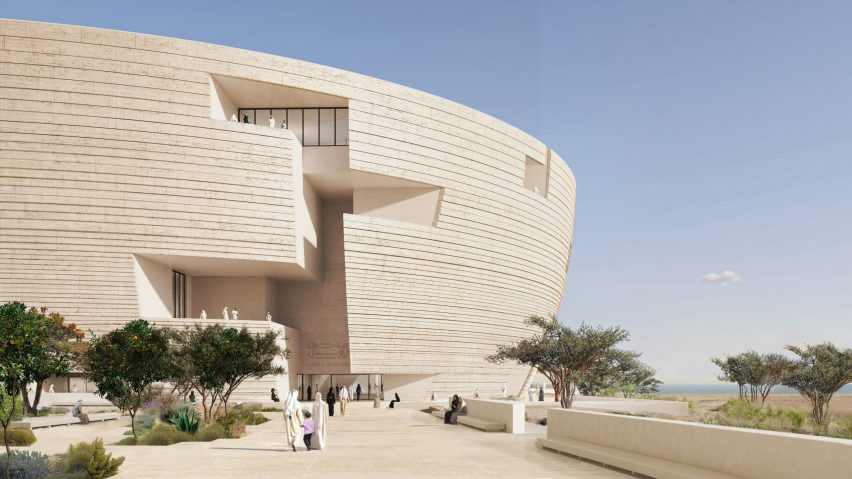Cultural institution Qatar Museums has released visuals of the Lusail Museum, a robust, drum-shaped gallery and museum designed by Swiss architects Herzog & de Meuron.
Located on Al Maha Island near Doha, the museum will reference historic Islamic architecture throughout its interior, aiming to become a cultural destination for education, exhibitions and research.
Herzog & De Meuron's proposed, five-storey building will have a form derived from three spheres that intersect and overlap to distinguish the internal volumes of the museum.
Responding to the coastal surrounds, the building's exterior will be rough and sand-like, with striated concrete in an earthy tone intended to blend into the land.
Deep cuts and geometric punctures will create recessed windows and entry points around the museum, while a series of skylights will be scattered across the building's roofscape.
According to the studio, the building was designed to ensure visitors have a visual connection to the sea, while also protecting the art from excessive natural light.
A crescent-shaped, skylit boulevard will curve between the building's looping volumes and act as a connection between the entrance, central lobby and gallery programs.
In addition to a library, auditorium, cafe, prayer space and rooftop terrace, the building will also house Lusail Museum's collection of Orientalist art at its upper levels.
Anchoring the exhibition spaces, four gallery rooms will replicate interior details abstracted from significant Islamic buildings, including the dome over Sultan Murad III’s bedroom in Istanbul's Palace of Topkapi and the Aljafaria Palace dome in Zaragoza, Spain.
The studio will extract ornamental features and geometries from the historic architecture to integrate into the cupolas, aiming to create unexpected spatial experiences for visitors.
At the roof level, the domed rooms will protrude through the floor plate, which will otherwise remain open to host public events such as an open air cinema.
While the building will primarily be shaped from rough and expressed concrete, Herzog & de Meuron will introduce zones of material contrast to designate key moments in the design.
For example, a spiral staircase leading to exhibition spaces will be sculpted from polished plaster, while the prayer room will be clad in reflective metal.
Tactile wood, textiles, ceramic tiles, upholstered niches and metal accents will also intersperse throughout the complex.
According to Qatar Museums, construction work will be a collaborative process with local artisans and craftspeople to ensure the design's vernacular references maintain genuine connections to the region.
Construction for Lusail Museum is expected to commence later in 2024, with a projected completion date of 2029.
The design for Lusail Museum follows Qatar's announcement to build three new museums by internationally recognised architecture studios Herzog & de Meuron, OMA and Elemental.
The city of Lusail also underwent recent development for the 2022 FIFA World Cup, with a golden football stadium and four aluminium-clad skyscrapers – currently under construction – both designed by studio Foster + Partners.
Pritzker Prize-winning studio Herzog & de Meuron has unveiled designs elsewhere for a giant cube storage building for Seoul museums and has completed an infinity pool at Lake Como that blends into the water.
The images are courtesy of Qatar Museums

